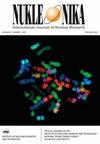A portable fast neutron radiography system for non-destructive analysis of composite materials
IF 0.3
4区 物理与天体物理
Q4 CHEMISTRY, INORGANIC & NUCLEAR
引用次数: 4
Abstract
Abstract Depending on the neutron energy used, neutron radiography can be generally categorized as fast and thermal neutron radiography. Fast neutron radiography (FNR) with neutron energy more than 1 MeV opens up a new range of possibilities for a non-destructive examination when the inspected object is thick or dense. Other traditional techniques, such as X-ray, gamma ray and thermal neutron radiography, do not meet penetration capabilities of FNR in this area. Because of these distinctive features, this technique is used in different industrial applications such as security (cargo investigation for contraband such as narcotics, explosives and illicit drugs), gas/liquid flow and mixing and radiography and tomography of encapsulated heavy shielded low Z compound materials. The FNR images are produced directly during exposure as neutrons create recoil protons, which activate a scintillator screen, allowing images to be collected with a computer-controlled charge-coupled device camera. Finally, the picture can be saved on a computer for image processing. The aim of this research was to set up a portable FN R system and to test it for use in non-destructive testing of different composite materials. Experiments were carried out by using a fast portative neutron generator Thermo Scientific MP 320.一种用于复合材料无损分析的便携式快中子射线照相系统
根据所用中子能量的不同,中子射线照相大体可分为快中子射线照相和热中子射线照相。中子能量大于1兆电子伏特的快中子射线照相(FNR)为被测物体较厚或致密时的无损检测开辟了新的可能性范围。其他传统技术,如x射线、伽马射线和热中子射线照相,都不能满足FNR在这一领域的穿透能力。由于这些独特的特点,该技术被用于不同的工业应用,如安全(违禁品,如毒品,爆炸物和非法药物的货物调查),气体/液体流动和混合以及封装重屏蔽低Z化合物材料的射线照相和断层扫描。FNR图像是在曝光过程中直接产生的,中子产生反冲质子,激活闪烁体屏幕,允许图像被计算机控制的电荷耦合器件相机收集。最后将图像保存在计算机上进行图像处理。本研究的目的是建立一个便携式FN R系统,并对其在不同复合材料无损检测中的应用进行测试。实验采用Thermo Scientific mp320快中子发生器进行。
本文章由计算机程序翻译,如有差异,请以英文原文为准。
求助全文
约1分钟内获得全文
求助全文
来源期刊

Nukleonika
物理-无机化学与核化学
CiteScore
2.00
自引率
0.00%
发文量
5
审稿时长
4-8 weeks
期刊介绍:
"Nukleonika" is an international peer-reviewed, scientific journal publishing original top quality papers on fundamental, experimental, applied and theoretical aspects of nuclear sciences.
The fields of research include:
radiochemistry, radiation measurements, application of radionuclides in various branches of science and technology, chemistry of f-block elements, radiation chemistry, radiation physics, activation analysis, nuclear medicine, radiobiology, radiation safety, nuclear industrial electronics, environmental protection, radioactive wastes, nuclear technologies in material and process engineering, radioisotope diagnostic methods of engineering objects, nuclear physics, nuclear reactors and nuclear power, reactor physics, nuclear safety, fuel cycle, reactor calculations, nuclear chemical engineering, nuclear fusion, plasma physics etc.
 求助内容:
求助内容: 应助结果提醒方式:
应助结果提醒方式:


